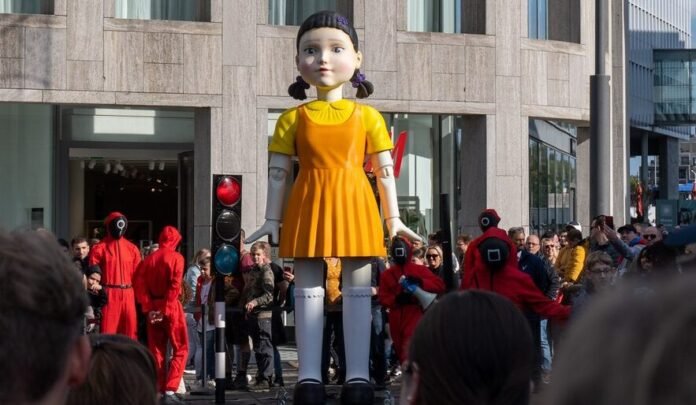As the series closes, South Koreans reflect on the harsh truths the show has echoed from real life
The giant killer doll is gone. The pink guards have marched their last parade. And with the release of its third and final season, Netflix’s Squid Game has officially ended. But while global fans bid farewell to the high-stakes thriller, many South Koreans say the show’s most brutal message is one they’re still living.
Squid Game captivated the world when it debuted in 2021, combining vivid aesthetics with a savage critique of capitalism. Contestants played deadly versions of childhood games for a life-changing cash prize—only to expose how little difference it made in a society rigged against them. Now, with its final episodes airing last Friday, the drama has come full circle: a story born from South Korea’s economic despair ends by confronting the very real conditions that inspired it.
“It reflected reality so well,” wrote one YouTube user after watching Season 3. “At work, it’s full of ruthless people ready to crush you. This show nailed it.”
The show’s roots run deep. Its lead character, Gi-hun, was laid off from a car factory and joined a strike, echoing the real 2009 SsangYong Motor labour battle, one of the fiercest in South Korean history. The cast—migrant workers, salarymen, debt-ridden hustlers—mirror the everyday citizens struggling in a society marked by youth unemployment, cutthroat academics, and widening inequality.
“Precarious labour, broken families—these aren’t just plot devices,” said Jeong Cheol Sang, a local film blogger. “They’re the world we live in.”
That gritty realism was momentarily shelved on Saturday, when a parade of Squid Game characters flooded central Seoul to celebrate the finale. Faceless guards in tracksuits, towering props, and neon pink lit up the city in a surreal send-off. But even amid the fanfare, the show’s stark warnings remained.
Embed from Getty ImagesPresident Lee Jae Myung has embraced Squid Game as a symbol of South Korea’s cultural export boom, riding alongside BTS and Parasite. But fans and critics alike are asking deeper questions. Does the country’s global success mask its internal crises?
The show’s finale sparked divided opinions. Gi-hun, the protagonist, fails to end the games and dies while saving a stranger’s child—an act some viewers saw as noble, others as absurd.
“The excessive altruism felt unhinged,” read a comment on Nate Pann, a major Korean forum. “It was fake kindness, putting strangers before his own daughter.”
Others praised the finale’s painful honesty. “That’s reality,” one fan wrote. “Gi-hun didn’t win. Because in our world, people like him don’t win.”
Creator Hwang Dong-hyuk defended the choice, noting that expectations had ballooned since season one. “Some fans wanted more games, others deeper meaning. Everyone wanted something different,” he said Monday. “But we had to stay true to the heart of the story.”
Actor Lee Jung-jae, who played Gi-hun, called the final moments “open-ended.” His hope? Viewers use the ending to question their own values.
For some, like blogger Mr Jeong, it worked. “Watching Squid Game made me reflect on myself,” he said. “I’ve worked in education and counselling. I’ve asked myself—can kindness really change anything?”
“Maybe not always. But that paradox—cruelty and warmth coexisting—is why this ending moved me. That’s why I call it beautiful.”
